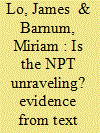| Srl | Item |
| 1 |
ID:
182677


|
|
|
|
|
| Summary/Abstract |
Scholars have used United Nations Secretary-General’s (UNSG) reports to extract information on peacekeeping operations (PKOs). As key peacekeeping political documents, UNSG reports contain much more information on the politics of peacekeeping. Furthermore, manually extracting information is costly and time-consuming. By providing a machine-readable collection of the UN Secretary-General’s Reports on PKOs (1994–2020), the PeaceKeeping Operations Corpus (PKOC) offers highly structured and multiformat text data that connect the peace and conflict research community to recent advancements in text-as-data techniques. Besides paving the way for the first quantitative content analyses on PKOs, PKOC speeds up and expands the range of information analysable from these documents and allows researchers to query them in a quicker, systematic and reproducible way. In this article, we discuss PKOC’s core characteristics. As illustration of the innovative potential of PKOC, we show how text-as-data approaches provide more nuanced understanding on PKOs’ evolution toward multidimensionality, both over time and within missions. While last generation PKOs are assumed to be multidimensional, we show how they vary in multidimensionality and how their complexity also changes throughout their life-cycle.
|
|
|
|
|
|
|
|
|
|
|
|
|
|
|
|
| 2 |
ID:
176043


|
|
|
|
|
| Summary/Abstract |
The Treaty on the Non-Proliferation of Nuclear Weapons (NPT) is a landmark international treaty that is widely regarded as a cornerstone of the global nuclear non-proliferation regime. However, pessimists point to a growing divergence of preferences between nuclear weapons states and non-nuclear weapons states as a precursor to the impending ‘unraveling of this vital piece of international law’. In this article, we test for evidence of preference divergence using statements from NPT review conferences, which are manifestos presenting each country’s position on the NPT. We measure preferences on the NPT using Wordfish, a method that is frequently used to estimate ideological preferences from election manifestos. Our measure estimates the latent positions of state actors along a ‘non-proliferation vs. disarmament’ dimension, and shows little evidence of growing preference divergence between the nuclear weapons states and non-nuclear weapons states. Thus, a significant premise underlying more pessimistic assessments of the NPT appears to be in doubt.
|
|
|
|
|
|
|
|
|
|
|
|
|
|
|
|
| 3 |
ID:
193841


|
|
|
|
|
| Summary/Abstract |
Fifteen countries recently signed the Regional Comprehensive Economic Partnership (RCEP) and formed the world’s largest trade bloc between some of the globe’s largest and fastest-growing economies. Employing a text-as-data analysis, this article systematically compares the text of the RCEP to the previous agreements of its members to determine the sources of language in the RCEP and investigate why particular treaty text is replicated more frequently relative to others. The results indicate that language derived from the multiparty and multicontinental trade agreements of the United States, a state not involved in the RCEP negotiations, accounted for a disproportionate share of the finalized text. These findings highlight the temporal dimension of power asymmetries as well as the importance of treaty design itself in the diffusion of regulatory norms and suggest that specific trade agreements serve as reference points for subsequent agreements.
|
|
|
|
|
|
|
|
|
|
|
|
|
|
|
|